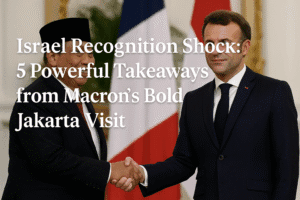Israel Recognition Shock: 5 Powerful Takeaways from Macron’s Bold Jakarta Visit
French President Macron’s Jakarta visit yielded significant diplomatic and strategic outcomes. Indonesia’s President Prabowo made a landmark conditional offer: Indonesia would formally recognize Israel if it first recognizes a Palestinian state, marking a pragmatic shift from the world’s largest Muslim-majority nation. Both leaders jointly condemned Israeli control of Gaza and population displacement, while demanding an “irreversible path” towards a two-state solution and mutual recognition, centering this goal for an upcoming UN conference France co-chairs.
Concurrently, they deepened bilateral ties, securing Indonesian commitments to purchase additional French Rafale jets, submarines, frigates, and artillery, alongside a strategic nickel mining partnership vital for electric vehicle batteries. Macron leveraged the visit to advance France’s positioning as a “third way” strategic partner in Southeast Asia, countering U.S.-China polarization and securing economic opportunities. The alignment showcases France’s ambition as an independent diplomatic actor and Indonesia’s growing willingness to engage pragmatically on complex global issues.
This convergence creates genuine diplomatic momentum, though translating conditional offers into lasting peace remains a formidable challenge.

Israel Recognition Shock: 5 Powerful Takeaways from Macron’s Bold Jakarta Visit
French President Emmanuel Macron’s recent visit to Jakarta wasn’t just another diplomatic stopover. It marked a significant moment where high-stakes geopolitics, a rare diplomatic shift from Indonesia, and tangible economic deals converged, offering a glimpse into evolving power dynamics in Southeast Asia and the Middle East.
The Diplomatic Breakthrough: A Conditional Path Forward
The most striking outcome was the unprecedented clarity from Indonesia regarding Israel. President Prabowo Subianto, leading the world’s largest Muslim-majority nation, declared: “Once Israel recognises Palestine, Indonesia is ready to recognise Israel and open diplomatic relations.” This explicit conditional offer breaks from Indonesia’s long-standing position of no formal ties with Israel, underscoring a pragmatic, albeit hard-won, pathway towards normalization contingent on Palestinian statehood.
Macron, actively positioning France as a mediator, seized this momentum. He echoed the call for mutual recognition, framing it as essential for the upcoming UN conference France co-chairs with Saudi Arabia in June. Crucially, both leaders:
- Condemned Israeli Plans: Their joint statement explicitly rejected Israeli control over Gaza and the forced removal of Palestinians.
- Outlined Conditions: Macron stressed recognition requires Palestinian state demilitarization (implicitly addressing Hamas) and acceptance of Israel’s right to exist and self-defense.
- Sought “Irreversible” Steps: They demanded the June conference produce a “credible roadmap” leading irrevocably to a two-state solution and mutual recognition.
This alignment between France and Indonesia injects a significant, non-Western Muslim voice into the push for a political solution, moving beyond mere rhetoric towards actionable, albeit conditional, steps.
Deepening the Strategic Partnership: Beyond Diplomacy
The visit was equally significant for bolstering the France-Indonesia bilateral relationship, yielding concrete agreements:
- Defense Leap: Indonesia signed a Letter of Intent for additional Rafale fighter jets (beyond its existing order), alongside commitments to purchase French-designed light frigates, Scorpene submarines, Caesar howitzers, and ammunition. This cements France as a major defense partner for Jakarta.
- Critical Minerals & Investment: French mining giant Eramet partnered with Indonesia’s sovereign wealth funds (Danantara & INA) to explore a strategic nickel investment platform. This taps into Indonesia’s vast nickel reserves, crucial for EV batteries, aligning with both nations’ economic and green transition goals.
- Broadening Cooperation: Memoranda of Understanding spanned disaster management, agriculture, transport, and culture, signaling a comprehensive partnership upgrade.
Macron’s “Third Way” in Action: The Geopolitical Context
This visit wasn’t isolated. It followed Macron’s stop in Vietnam, where he positioned France as a “power of peace and balance.” His Southeast Asian tour had a clear strategic aim:
- Countering US-China Polarization: Amid Trump’s tariff threats and US-China tensions, Macron promoted France (and the EU) as a reliable alternative partner – a “third way” offering stability and rule-based engagement.
- Securing Economic Opportunity: The defense deals and nickel partnership are tangible wins for French industry in a rapidly growing region, diversifying away from over-reliance on traditional markets.
- Asserting Diplomatic Influence: Taking a lead on the Israel-Palestine issue, especially alongside Indonesia, demonstrates France’s ambition as an independent global diplomatic player, distinct from US policy.
The Human Insight: Nuance Amidst Complexity
Beyond the agreements and statements, this visit revealed nuanced realities:
- Prabowo’s Calculated Move: His recognition offer is groundbreaking domestically. It reflects a pragmatic assessment of global realities but carries political risk, requiring careful navigation of strong domestic Palestinian support.
- The “Mutual” Imperative: Both leaders emphasized mutual recognition – a subtle but vital point often lost in the discourse. Peace requires both sides to acknowledge the other’s legitimacy and security needs.
- The Long Road Ahead: While the June conference is framed as crucial, the conditions laid out (Hamas demilitarization, Israeli acceptance of Palestine) remain monumental hurdles. Momentum is building, but tangible progress is far from guaranteed.
Conclusion: More Than Symbolism
Macron’s Jakarta visit transcended ceremonial diplomacy. It forged a surprising alignment on one of the world’s most intractable conflicts, delivered significant economic and defense partnerships, and advanced France’s strategy as an independent power navigating an increasingly fractured world. The challenge now lies in translating the joint statements from Jakarta – particularly the delicate conditional recognition offer and the push for mutual guarantees – into concrete, irreversible actions on the path to peace and deeper Indo-Pacific cooperation. The world will be watching the June UN conference closely to see if this momentum can be sustained.
You must be logged in to post a comment.